January 6th is my mother’s birthday. As a present, I decided to showcase the first scientist I ever knew—one who I met before I was even born. Arleen Garfinkle (one day to be Arleen Miller) entered graduate school at the University of Colorado in the fall of 1973 and graduated in 1979. During that time she developed a battery of tests designed to track a child’s numerical and logical reasoning skills, based on the theories of psychologist Jean Piaget. Once she developed the test, she gave it (and several other tests) to over 200 pairs of twins aged four through eight and
science
Computer Related / Electronics / logic / etc.
Non-Digital Computers
Non-Digital Computers This is the last installment of my many-part series on computers. Last time we used the notion of a Turing machine to define what a computer is. We discovered something surprising: that not all computers need to be digital, or even electronic! A computer can be mechanical, made of dominoes, or even just a rules system in a card game. To give you of a flavor of how inclusive the definition of a computer really is, I’ll now give you a whirlwind tour of some notable examples of non-digital computers. The Antikythera Mechanism In April of 1900,
